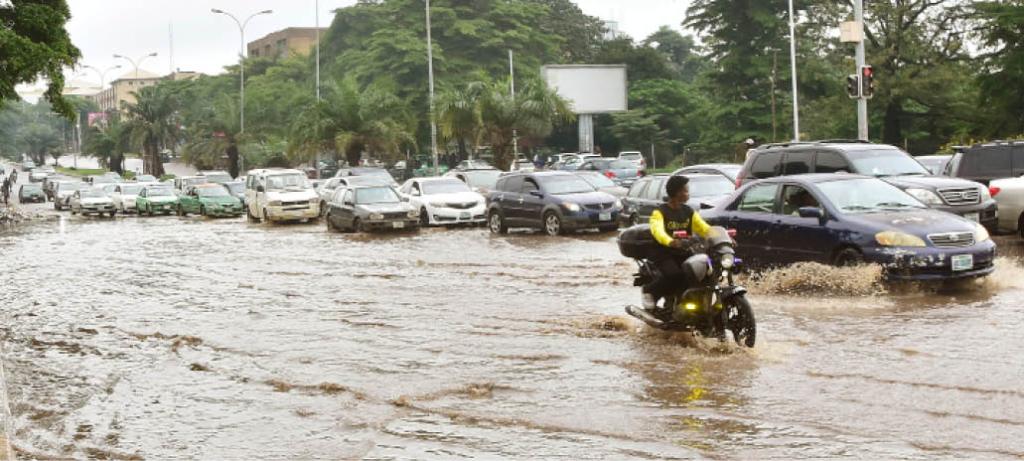
Heavy rainfall unleashed widespread flooding across parts of Abuja and Katsina on Thursday, submerging major roads, destroying homes, and displacing more than 1,000 people.
In Abuja, torrents of water swept through Asokoro, Guzape, Jabi, Kado and Wuse districts, leaving motorists stranded for hours. Videos shared on Facebook by one Prince Adebisi Adetunji showed sheets of muddy water covering parts of the road in Asokoro, with residents and drivers struggling to navigate the area.
Many commuters said the downpour brought traffic to a standstill. “The FCT Administration needs to find a solution to the poor drainage system in the nation’s capital,” said motorist Emmanuel Peter. “This also happens in Jabi, Wuse, and even the Central Business District every year. Something needs to be done by those managing the city to address the drainage issue.”
Another driver, Musa Ibrahim, said roads in Asokoro and Guzape became nearly impassable, while Alhaji Nuhu Ademola recounted how his car was stuck in floodwaters near Jabi Motor Park for 30 minutes. “Of course, we don’t need to be telling them as they can also see it. How do you expect the nation’s capital to be built with a careful and well-planned drainage system,’’ he said.
Similar flash floods were reported in Life Camp, Wuse, and under the bridge near Kado Roundabout. “This happens on this road after every rain. We have been appealing to the FCT Administration to do something about this but nothing is being done,’’ said Mallam Awalu Dahiru, who plies the Kado–Airport Junction route.
Town planners say a combination of natural and human factors has worsened the floods. “Towards the end of every rainy season, the intensity of the rain is so high that it is difficult for the ground to drain it, causing the water to overflow the drainages,” said Abuja-based planner Lami Ayuba. She added that improper waste disposal often blocks drainages and called for constant clearance, better waste management, and public sensitization.
Another planner, Adeyemi Iyanda, blamed infractions to the city’s masterplan and illegal structures on waterways. He urged the FCT Development Control Department to intensify enforcement and demolish buildings obstructing drainage channels.
Officials say steps are underway. A senior officer at the FCT Department of Development Control, who requested anonymity, said a special task force led by Director Muktar Galadima has begun removing illegal structures in Garki, Durumi, and Wuse. He warned, however, that the flooding could not be completely stopped immediately because of long-term damage to the city’s drainage system.
Meanwhile, in Katsina State, a dam overflow triggered by heavy downpour and strong winds devastated Kankia Local Government Area, displacing more than 1,000 people and destroying hundreds of homes. Residents said the aging Kankia dam worsened the disaster.
One victim, Adahama Rabe of Kofar Yamma, said her house collapsed with over 20 people inside. The flood also submerged the 40-year-old JIBWIS Mosque in Layi quarters, forcing worshippers to relocate Friday prayers.
The Katsina State Emergency Management Agency (SEMA) has pledged immediate support, including temporary resettlement and relief materials. “We are working to provide support for a hitch-free assessment of the incident,” said the National Emergency Management Agency (NEMA) Kaduna Operations Office in a statement.
NEMA said about 200 people are currently sheltering at Tashan Lado Primary School near the Kankia Local Government Council Secretariat, while joint teams from NEMA, SEMA and the Nigerian Red Cross continue damage assessments and evacuations. “The assessment team is facing challenges accessing some severely affected communities as a result of an early-morning rainfall in the area, hindering efforts to determine the full extent of the damage,” the statement noted.
Similar flooding was reported in Shinkafi, Unguwar Alkali, Makudawa, and parts of Kwado, where residents lost homes and livelihoods. Local officials have urged residents to clear waterways and obey environmental warnings to avert future disasters.
